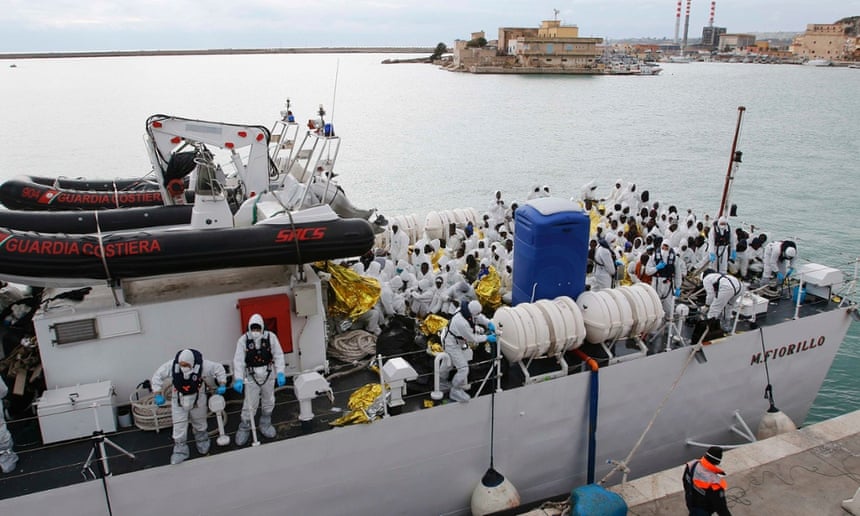Thousands of migrants have risked their lives in rough winter seas in the last week as they tried to reach Italy from Libya, among them reluctant travellers who were forced into rickety boats at gunpoint.
The surge in crossings at a normally quiet time of year suggests plans to deter migrants by cutting back rescue operations have failed, as aid groups had warned they would. There are fears the summer peak may bring more loss of life.
“The situation in Libya is so chaotic, whatever policies we adopt it doesn’t matter, they are desperate to get away. There are going to be some terrible tragedies unless we step up search and rescue,” said Leonard Doyle, from the International Organisation for Migration (IOM), which documented the deaths of more than 3,200 migrants trying to reach Europe by at sea last year.
Worries about a growing presence of Islamic State (Isis) in Libya, and unverified fears that militants might try to infiltrate migrant boats, may however achieve what humanitarian concerns could not.
On Wednesday, Italy’s foreign minister, Paolo Gentiloni, called for an expansion of the EU’s Triton maritime border patrol, which is effectively a search-and-rescue mission as well.
“We must significantly reinforce Triton to bring it into line with the reality of the scale of the problem,” he told the Italian parliament, after calling for an international intervention to halt Libya’s descent into chaos.
Over the weekend, Isis militants in Libya posted online a video message, warning that the jihadi group was “just south of Rome”. The Italian capital has long been named a target by Isis, owing to the presence of the Vatican.
In response to the video Italy’s interior ministry announced on Tuesday that 4,800 soldiers would be deployed to protect sensitive sites. Increased security is expected at the Vatican, embassies and popular tourist spots as part of the “safe streets” operation.
On the tiny island of Lampedusa, Italy’s southern-most outpost and first landing point for many migrants rescued at sea, more than 1,200 people are crammed into a reception centre that can only hold a few hundred. The UN estimates that at at least 2,600 others have been taken to other rescue centres since Friday.
“We have been told by the people who have arrived that the traffickers would literally push people to board rubber dinghies with weapons. With the bad weather and the small vessels [the journey is] like a death sentence,” said Federico Fossi, a spokesman for the UN high commission for refugees in Italy, who is currently in Lampedusa.
New arrivals also rose by two-thirds in January, compared with the same month in 2014, even though there were better search-and-rescue operations a year ago, Fossi said.
The overcrowding is so now bad on Lampedusa that supplies of clothing, food and water for new arrivals has run out. The latest migrants to arrive were sleeping in the open air around the buildings, and still wearing clothes soaked with sea water from their voyage.
“The situation is quite critical,” Fossi said. “You can imagine the condition of the people arriving, most of them are in a state of shock, they haven’t been eating or drinking for maybe a couple of days, and therefore … it’s urgent and important that they receive all the needed assistance.”
Italy’s major search-and-rescue operation Mare Nostrum ended last autumn after picking up more than 140,000 people from the Mediterranean in 12 months. It was replaced by the much smaller Triton programme.
Refugee support groups warned at the time that the change would cost lives, but politicians argued that rescuing migrants only encouraged more to attempt the crossing. Britain refused to contribute, on those grounds.
The UK government believes there is “an unintended ‘pull factor’, encouraging more migrants to attempt the dangerous sea crossing and thereby leading to more tragic and unnecessary deaths”, Lady Anelay, a Foreign Office minister, said in a written answer to the House of Lords last year.
The mayor of Lampedusa, Giusi Nicolini, described the UK decision as cold-hearted, and one that would cost lives. Her community of just a few thousand people is on the frontline of the refugee crisis, and has in the past been reduced to fishing corpses from waters around the island.
“Mare Nostrum was an emergency solution to a humanitarian crisis, so closing it was a huge and intolerable step backward,” Nicolini said, after at least 29 migrants died from hypothermia during a long journey on open coastguard vessels.
Most of the new arrivals are non-Libyans, many of them trapped in the country after it spiralled into chaos. The UN is trying to arrange papers for those who want to leave by road or plane, rather than risking the Mediterranean crossing.
“Its a very tough situation for the migrants, many of them came to work in more peaceful times then their documents were confiscated, or lost or burned,” said IOM’s Doyle. “To get over the border they need papers. We have people working in Libya ... and they are trying to get them new ones so they can travel home.”
Those fleeing across the Mediterranean in recent days also include about 100 Italians, escorted by the navy after Rome closed its embassy in Libya and warned all nationals to leave the country.
While Italy has ruled out immediate military intervention in Libya, Gentiloni said on Wednesday that time was running out for a political solution. A diplomatic response is necessary to resolve the current crisis, he said, announcing Italy’s willingness to support a UN-led ceasefire.
